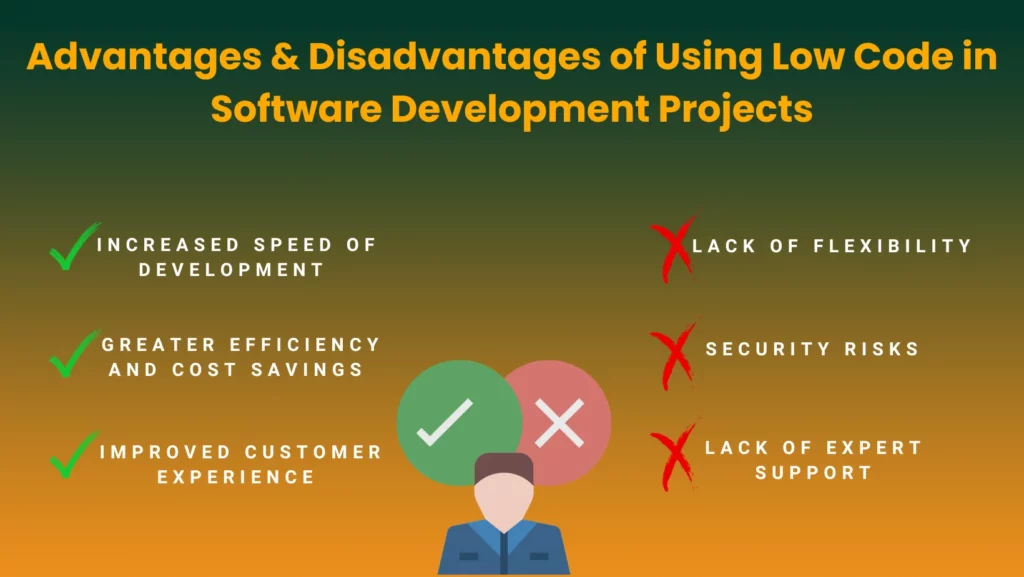Are you considering transitioning into a career in software development, but feeling overwhelmed? Low-code solutions are becoming an ever-popular option for those looking to master the coding side of software development without starting from scratch. But what does this mean for traditional software developers and future newbies?
In this article, we’ll dive deep into the impact that low code has on our industry – examining both its positives and negatives. By taking a closer look at how learning low code can help accelerate your career progression within software development, you will be better equipped to capitalize on the opportunities that come with it!
Table of contents
- Interested in software development?
- An Overview of the Software Development Industry and the Impact of Low Code
- Benefits of Learning Low Code for Software Developers
- Different types of Low Code tools available on the Market
- Advantages & Disadvantages of Using Low Code in Software Development Projects
- The Impact of Low Code on the Future of the Software Development Industry
- Frequently Asked Questions About Career Progression with Learning Low Code: The Impact of Low Code on the Software Development Industry
- Conclusion
Did you know?
- Microsoft anticipates that of the 500 million apps it expects will be created over the next five years, 450 million will be designed on no-code low-code platforms.
- Gartner predicts active citizen developers will be at least 4X the number of professional developers at large enterprises by 2023
- Almost 60% of the custom apps are now built outside the IT department. Of those, 30% are built by employees with limited or no technical skills.
Interested in software development?
Have you ever wanted to work as a software developer without needing to have the technical skills? Low Code technology is transforming an entire industry and giving developers like you the opportunity for career progression. Learn more about how Low Code can give you the edge when it comes to getting your dream job.
With Low Code, you can quickly prototype applications, develop new solutions at a rapid pace, gain insight into processes that weren’t easy before, and take on challenges that will push your skillset further. The opportunities are endless!
Keep reading and Let’s shift what is possible and create amazing things together.
An Overview of the Software Development Industry and the Impact of Low Code

Low-code platforms have been around for quite some time, but they’re only recently becoming more popular with businesses and organizations looking to quickly develop applications. These platforms allow developers to create software without writing code from scratch. Low code is revolutionizing the way developers build applications and websites – and this has major implications for the industry as a whole.
Some of the Impacts of low code in the software development industry include:
- Increased efficiency and speed of development – Low code allows developers to quickly prototype applications, making it easier to create new solutions. Software development lifecycle times have also been reduced which means less time wasted on the debugging process and more time spent focusing on core tasks such as product design.
- Cost savings – Companies can save money on infrastructure by using low-code platforms to build integrated applications. It also eliminates the need for expensive software licenses as they are no longer needed with a low-code platform.
- Improved customer experience – Low code platforms allow developers to quickly build applications and websites that provide a better user experience for customers. This can lead to increased customer loyalty and satisfaction.
Benefits of Learning Low Code for Software Developers

Citizen developers have been able to create applications and websites faster than ever before thanks to the rise of low code. But what does this mean for software developers?
One of the main benefits of learning Low Code is that it helps developers gain a better understanding of how to build robust, secure, and scalable applications. Other benefits include:
- Expanding technical capabilities – Low code allows developers to quickly prototype applications and tap into the power of AI/ML, thereby deepening their technical knowledge.
- Breaking into new industries – The low code revolution is not limited to software development alone. With Low Code, developers can now break into other industries such as financial services, healthcare, manufacturing, etc., creating new opportunities for career progression.
- Streamlined program management – Low code platforms allow developers to efficiently manage their projects, reducing the amount of time spent on debugging and maintenance tasks.
Low-code developers and the general developer population will both benefit from the advancements that have been made in Low Code development. It can open the door to more career options, and allow developers to become more efficient at their craft.
Different types of Low Code tools available on the Market

No-code technologies and low-code platforms are quickly becoming the go-to choice for businesses and organizations looking to accelerate their digital transformation efforts. But with so many options on the market, it’s important to know which one is right for you.
Some of the popular low-code platforms available today include:
- Mendix – A platform that allows developers to create applications quickly and easily.
- Outsystems – An open-source low-code development tool for building web and mobile applications.
- WaveMaker – A low-code platform for rapid development of web and mobile applications.
- Alpha Anywhere – An enterprise-grade low-code development platform for building web and mobile applications.
- QuickBase – A low-code development platform for building custom applications quickly and easily.
These are just a few of the many options available today, so it’s important to do your research before selecting the best one for your needs.
Advantages & Disadvantages of Using Low Code in Software Development Projects

Low-code tool kits offer many advantages for developers, but they also come with a few drawbacks. Low code technology for business solutions and software developments can be beneficial in several ways, including:
- Increased speed of development – Low code platforms allow developers to quickly prototype applications and build complex solutions with minimal effort.
- Greater efficiency and cost savings – Companies can save money by using low-code platforms to build integrated applications.
- Improved customer experience – Low code platforms allow developers to quickly build applications and websites that provide a better user experience for customers.
However, Low Code also has a few drawbacks:
- Lack of flexibility – Since Low Code is pre-built, there is usually less flexibility when it comes to design and customization.
- Security risks – With Low Code, developers must be mindful of security issues as they can be more at risk with a pre-built platform.
- Lack of expert support – As Low Code is still relatively new, there may not be enough experts around to provide help and advice on the platform itself.
Using a low-code platform is a great starting point for developers as it helps speed up the development process. However, it’s important to weigh up all the pros and cons before making a decision. As Low Code technology continues to evolve, more advantages and disadvantages will become apparent.
The Impact of Low Code on the Future of the Software Development Industry

The development environment for software solutions is quickly transforming, as Low Code platforms become the preferred choice for businesses and organizations to create applications.
The rise of Low Code has also had a significant impact on the future of software development industry itself. The need for developers with specialized skill sets is decreasing as low-code platforms allow for faster development and application deployment. As a result, developers are forced to focus more on the design aspect of software development rather than the technical aspects.
In addition, Low Code technology has enabled companies to build applications with minimal resources and labor costs quickly. This decreases the need for expensive software licenses as they are no longer needed for development.
Low Code will continue to be a game-changer in the software development industry and developers must stay ahead of the curve. Learning Low Code is essential for staying competitive, as it can open up new career opportunities and provide greater insights into developing secure, robust applications.
The future of software development looks to be bright, as Low Code platforms and tools continue to evolve. As the technology becomes more advanced, so too does the potential that Low Code has in transforming the software development industry. With a rising demand for applications, businesses will have to look to low-code solutions to remain competitive.
Frequently Asked Questions About Career Progression with Learning Low Code: The Impact of Low Code on the Software Development Industry
Q: Do low code skills help in career progression?
A: Yes, low code development can open up new opportunities for career progression as it enables developers to build complex and secure solutions quickly.
Q: Why low code developer and developer community will both benefit from the advancements?
A: Low code developers have access to tools that are designed to help them speed up their development processes, while the general developer population can benefit from quicker debugging and maintenance tasks.
Q: What impact will Low Code have on the software development industry in the future?
A: Low Code technology has already had a significant impact on the software development industry, with companies now able to quickly build applications with minimal resources and labor costs. As Low Code continues to evolve, the potential for transforming the way developers work is only going to increase.
Conclusion
Low code development has opened up a wide range of opportunities for business owners and software developers alike. It’s becoming increasingly obvious that the development industry will continue to be impacted by low-code solutions in the future, providing beneficial changes to how software is developed and maintained. As we shift further and further into an age of technology, it’s clear that software development using low-code tools will help pave the way for innovative app ideas through faster production speeds and more durable long-term maintenance plans.
All in all, this exciting new approach to the software industry is sure to offer remarkable opportunities for success now and in years to come – so don’t forget to start exploring your options for taking on low-code app development!

